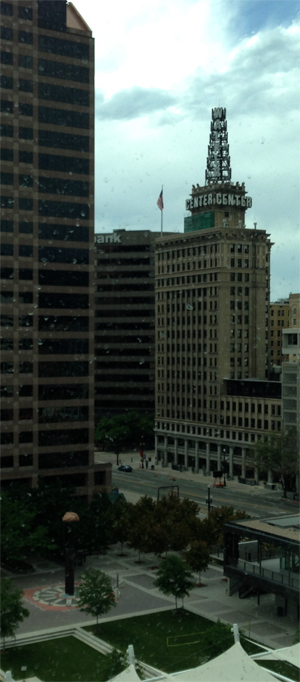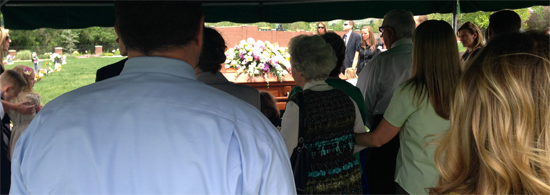 Last week, my older brother Mike got one of those calls no father can ever really process: There had been a car accident. His son David, David’s wife Becky, and their four children were in a car accident. Becky (35) had been killed. The children, all eight years or under, were being rushed to the hospital. David was in critical condition and being airlifted out.
Last week, my older brother Mike got one of those calls no father can ever really process: There had been a car accident. His son David, David’s wife Becky, and their four children were in a car accident. Becky (35) had been killed. The children, all eight years or under, were being rushed to the hospital. David was in critical condition and being airlifted out.
For a few hours, that’s all anyone knew about the details. Mike phoned me with the news, and as I pressed for information, he said, “that’s all we know. We’re on our way there.” I told my brother I loved him. He began to weep and before hanging up, he said “take care of your kids.”
There’s nothing you can really say about this kind of tragedy. Upon the death of his wife, C.S. Lewis wrote a book entitled A Grief Observed. I have never read it, but I understand his thesis: when people endure the ultimate loss, their friends say stupid things. The stupid things are not comforting. They are annoying. They lack credibility. They are well meaning, to be certain, but they are the words of people who are standing outside the primary combat zone, shouting solace from the rear of the battlefield.
Having lost my older sister when I was sixteen, I know that both this and the opposite are true: people tell you how much they love you, and how much they love your family. I found those words comforting. I found in them some some broader comfort that made the loss more bearable. Death was the exception. Love was the ongoing reality. The power of the love, in fact, was brought into high relief by the sorrow of the death.
Of course, people also tell you to “bear up,” to “be strong,” to know that this, too, is in “God’s plan.” I never found that comforting, nor did I find conjecture about the afterlife to be very convincing, not because I didn’t believe in it, but, because that seemed to be in God’s hands. When we speak for God, on specifics, it can mock real faith by careless conjecture, thrown out there because we have nothing to say.
Imagine Jesus, weeping, at the death of His friend, Lazarus. If the Lord God of all Creation was troubled, and stung, by the death of His friend, who are we to stand there and put a bow on the whole package? “There, there, Jesus.” That’s a bit like dying of thirst and hearing someone say, “cheer up; we might find some water next week.” Death is a bitch. It’s a cold, heartless, vineyard-stealing Jezebel of a bitch. In my nephew’s case, it left a husband and four children behind, and an extended family stunned by the life changes they were facing.
The prospect of being able to say anything comforting, or do anything of value, always seems a little remote to me, but I know from having lost my own sister, and my parents, that the mere presence of family is comforting at a time of loss, even if we aren’t apt to say the right things.
So along with my wife Mary and my brother, Scott, we set the alarm clocks for 3AM and trundled off to the airport, so as to rent a car in Salt Lake City and make the 30 minute drive to Kaysville in time for the 11AM funeral. I’m not entirely sold on this part of the modern age — seven hundred miles in 70 minutes. It’s absurd. The aircraft look too flexible, too complicated. Some rivet is bound to pry loose. Wouldn’t it add tragedy upon tragedy if we were to be taken on the way to a family funeral?
I know, I know — air travel is a lot more healthy than developing a liking for Ruffles Potato chips, but if you have a dark imagination, like mine, you see some kid in Enterprise, Nevada reaching up to see if that piece of fur on the apricot tree is really a part of your scalp, blown free by the impact. Against these harsh imaginations, and turbulence, it’s nice to be able to sit besides your wife. You can reach over and hold onto her leg. A strange woman might not be as understanding.
 I ordered a gin & tonic to restore my optimism. The little blue bottle of Bombay Gin brought back a pleasant memory of my mother, who did not drink, but who saw beauty in the small colored glass bottles, and would ask the stewardess to collect them for her. Mom would walk through airports, much to my father’s horror, toting a clear plastic bag full of discarded Jack Daniels, Dewars, and Tanqueray bottles.
I ordered a gin & tonic to restore my optimism. The little blue bottle of Bombay Gin brought back a pleasant memory of my mother, who did not drink, but who saw beauty in the small colored glass bottles, and would ask the stewardess to collect them for her. Mom would walk through airports, much to my father’s horror, toting a clear plastic bag full of discarded Jack Daniels, Dewars, and Tanqueray bottles.
I wondered about having a gin & tonic before a Mormon funeral, but only for a moment. I was barreling along at 600 miles per hour, in an aluminum tube, 37,000 feet above sea level. It seemed about as good a reason for a drink as any. And, besides, with respect to this funeral, I carried my “small, reformed house church” prejudice very close to the surface. I left Mormonism at age 19, wandered the agnostic road for some time, got married, had a child, and found myself weeping one night, grateful for the Jesus I began to meet in the text itself. I tend to be dismissive of anyone selling me “Jesus PLUS.” (Jesus plus the Rosary, Jesus plus temple ordinances, Jesus plus a Baptist anti-alcohol pledge) When someone appears to be wrapping up God in their own denominational flavor, I get cranky, and I didn’t want to be cranky, at a funeral, around my loved ones, who were hurting. Some people are given big, open, generous hearts, but most would be better company with a gin & tonic in hand, and I’m one of them.
At the funeral, I met Becky’s father for the first time, and all I could say were the words, “so sorry; so, very, very sorry.” I ached for him, and I began to tear up. We looked away from each other, with nothing more to say.
Funerals are unpleasant reminders of our age — and everyone else’s. Once you have passed the half century mark, you begin to feel age in everything — your joints, your thinning, graying hair, your eyesight, your hearing. A cousin of mine, only a few years older than I am, was complaining about “senior moments.” It didn’t seem fair, for some reason, that we were both once in our early twenties, swapping college stories.
The service didn’t strike me as overly denominational; it just felt like cousins and uncles expressing their great sorrow, and their commitment to help Becky’s children as they grew, to be there for them. It was on opportunity to reaffirm the importance of family, and not just nuclear family, but cousins, great uncles, grandfathers, 3rd cousins. At the graveside, the smallest of the children, a six month old baby, was held next to the casket, so that she could drop a flower onto her mother’s grave. That nearly did Mary in. She had to walk off for a moment among the headstones. We cooled ourselves in the rental car, discussed the accident, and drove off to another church building for the reception.
I don’t hear well, and a church basketball court, echoing the clatter of a buffet line, is just about the ultimate challenge. I could either pretend I was hearing the conversation, and look dumb, or ask everyone to repeat everything. I chose to look dumb–and old. When they began clearing the room, I begged off from further visiting, because, well, I wasn’t really capable of it. I hope Mike forgives me. We drove off to Salt Lake and our room at the Marriott.
If it’s a sin to take comfort in a hotel room, with fresh towels, cold clean linen, room service, a bucket of iced wine, and the comforting presence of my wife, then I stand convicted. Sometimes it feels like rest against an oncoming storm. I was a grind growing up. As a young guy in business, I couldn’t imagine a vacation longer than a few days. My wife taught me to enjoy the break at the end of the harvest, to plan for rest, to insert small doses of joy in the deck of cards we call life, because we never know what news the day will bring.
I looked out over the skyline of Salt Lake. It isn’t New York, to be certain, but nine stories up, just about anywhere, is pretty grand. My sister began her professional life as an illustrator in this city, and I wondered where her old gallery haunt might have been in the streets I saw below me. She has been gone nearly forty years, and I still remember her. I wanted to write the whole day down, but I had forgotten my laptop, and I made a mental note to myself: no matter where you go, Jim, take a typewriter with you. It doesn’t matter who reads it, or if anyone reads it. It will help you make sense of the day, even when there is no sense to be had.
I sat down on the couch. We talked, without much direction, about the accident. I told Mary how much I loved her, and how much I have come to need her. I was wept out, but my eyes were hot, and she held my head in her hands. I got to thinking of the way we men, as boys, talked about girls. They were “hot,” to be certain, and there’s a thousand brazen memories of the way we described them in bikinis, or on hot summer days the way they looked in halter tops and shorts, and it wouldn’t be wrong to think of this all as hunt, because that’s what it was. Teenage boys, generally, don’t get caught weeping about undying, romantic love. But that savagery of the heart mellows, and eventually, you see a number of little heads around the table, and your best friend on the other side of it. What began as something primordial became the sweetest, most civilized partnership you can imagine. It’s still hot, but it’s steady too.
A man who loses that, to death, is cut, horribly, from his anchor. She really was his helper, his friend, his lover, his harbor against the hurricane. Even if he knew that, he didn’t really know that. No one can, until it happens.
Mary stroked my head.
“Do you know how much?” I asked.
“I do.”
